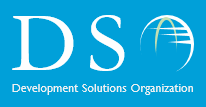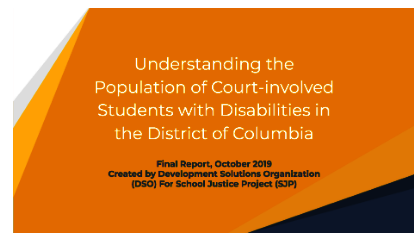Hello!
In this report, we feature our recently-concluded work with the School Justice Project, which is a legal services and advocacy organization serving older students with special education needs who are involved in the District of Columbia’s justice systems.
Featured Project
From October 2018 - October 2019 Development Solutions Organization (DSO), a non-profit consultancy, worked with School Justice Project (SJP) and the Public Defender Service for the District of Columbia (D.C.) to identify key questions to understand the issues that students with disabilities in D.C.’s justice systems face. DSO’s partner from SJP is the co-chair of the D.C. Superior Court’s Juvenile Justice Subcommittee of the Court Education Work Group and a member of the Students in the Care of the District of Columbia Working Group (convened by Councilmember David Grosso) while DSO’s partner from PDS is a member of both groups.
These groups are focused on improving education for court-involved students via cross-collaboration and coordination among a variety of agencies. The Students in the Care of D.C. Working Group introduced several policy and legislative recommendations listed in the Students in the Care of D.C. Working Group Recommendations (2018 Report) that aim to improve educational opportunities and student achievement of court-involved students. One of the legislative recommendations to establish a Standing Coordinating Committee is moving forward and will be in place next year. As stated in the 2018 Report, the purpose of the permanent Standing Coordinating Committee is to allow agencies, local education agencies, attorneys, advocates, and former students to continue to identify challenges and resolve issues that students in the care of D.C. face in order to improve educational opportunities and student achievement.
In D.C., court-involved students experience challenges enrolling in school, obtaining transferable credit, and receiving special education and related services. D.C.’s justice systems’ responsibilities are split between local D.C. agencies and the federal government, resulting in a fragmented system with lack of cohesion between stakeholders and agencies. DSO’s data findings highlight the lack of data being captured and shared by the various stakeholders. The questions specifically explore statistics around students with disabilities, students with Individualized Education Programs (IEPs), and legal representation.
The lack of publicly available information (aggregate and individual student-level data) is especially notable for certain statistics, such as the number of students with IEPs or who previously had an IEP. Moreover, the students recorded in these statistics are highly mobile, frequently moving in and out of the justice system, foster care, and schools. For dual-jacketed students, those who are involved in the juvenile justice system while in foster care, DSO recommends a comparative and bottom-up approach that would entail contacting agencies that are willing to share individual student-level data, identifying points of contact, compiling lists of students, and passing along the lists to other organizations through Memorandum of Agreements (MOAs).
DSO also looked into credit transfer and special education representation. Regarding credit transfer policies, DSO conducted research on case studies of credit transfer and partial credit policies in 11 states. Through studying the policy landscape in each individual state, DSO gathered key issues that match with D.C.’s pain points regarding credit transfer and recommended best practices to mitigate existing problems. Specifically, the states of Maine, Oregon, and California are highlighted. The Texas Blueprint Committee on education is also studied as an exemplary case for sustainable cross-organization collaboration that encourages accountability.
Through the research process, there are still more questions to be answered and statistics to be explored. In the final section of the report, DSO compiled next steps and additional questions that will be useful to the Standing Coordinating Committee, which was codified by the recent Students in the Care of DC Coordinating Committee Act of 2018. Next steps encompass additional data requests to agencies, alternative data extraction pathways, and more subjects of relevance to the key questions mentioned above. These next steps will hopefully provide a launchpad to improve the education experience for D.C.’s court-involved students. Our Executive Summary deck presented to the Juvenile Justice Subcommittee on 9/25/19 is linked below. To obtain more information about the report, please contact SJP’s Executive Director, Claire Blumenson at info@sjpdc.org.
The DSO team was comprised of DSO Engagement Leads Haejin Hwang, Anthony Buchanan, Justin Pizzimenti, Haidi Al-Shabrawey, and Sanjana Padmanabhan, as well as our remarkable student consultants, Alice Ye, Chloe Li, and Javier Guerrero Vicente. Our wonderful partners on this project included Claire Blumenson, Co-Chair of the Juvenile Justice Subcommittee and Executive Director of School Justice Project, Tayo Belle, Senior Staff Attorney at School Justice Project, and Nakisha Winston, Staff Attorney at Public Defender Service for D.C.
Testimonial
“Working with the DSO team was an incredible experience. The leadership the team provided on these difficult issues was unparalleled, and the deliverables that the team produced were high-quality, professional, and extremely useful to our organization and the entire DC community. We are so grateful to the DSO team and students for dedicating such significant time and energy to the research and report. They tackled issues we at SJP have been struggling with for years, and their thorough research, quality synthesis of materials, and detailed analysis will have an enormous impact on improving education for court-involved students with disabilities in DC. Thank you, DSO!” - School Justice Project
Links:

